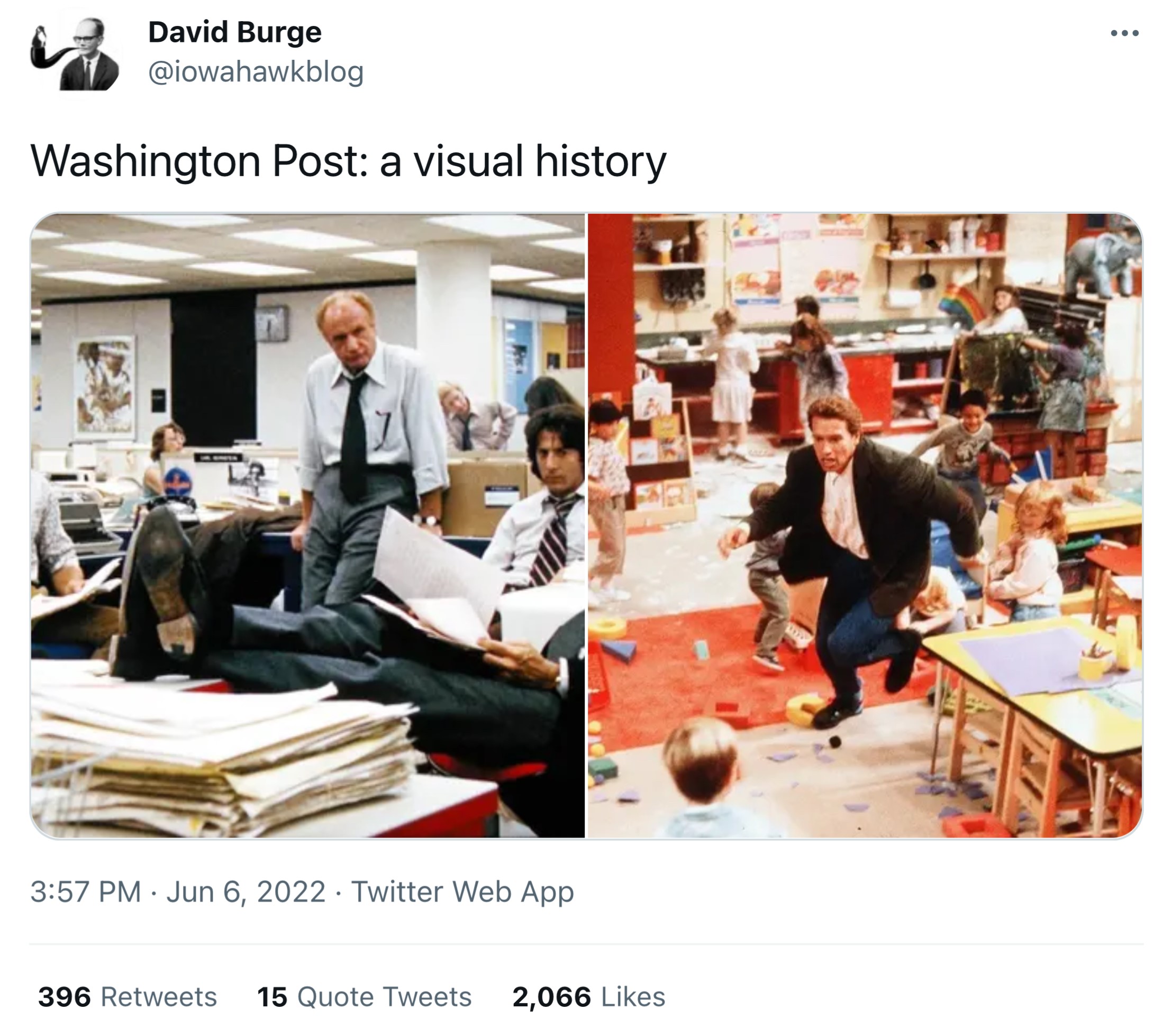WAPO FIRES EDITOR, REPLACES WITH WSJ AND TELEGRAPH ALUMS:
Well, well, well. It shouldn’t surprise me, but it still kinda does.
After losing half its readers and hundreds of millions of dollars, the Bezos-owned newspaper is radically shifting strategies.
Sally Buzbee, the author of this absolute disaster, no doubt left under her own steam to spend more time with her family or something similarly false and anodyne-sounding. It certainly had nothing to do with the wreckage of a once-great and respected news outlet.
* * * * * * * *
I, for one, thank her for helping inspire this dramatic shake-up. Among other things, it looks like the Post will be putting much of its most egregious propaganda-producers in a new division of the newsroom, and it may even rededicate the regular newsroom to reporting actual news.
Perhaps. I will believe that when I see it, but clearly there is at least a desire to do so. After all, the interim Executive Editor will be coming from The Wall Street Journal and the permanent replacement will be coming from The Telegraph Group–you may recall, I have recommended The Telegraph in one of my Things I Like columns.
The Wall Street Journal is not actually a conservative newspaper–it’s opinion section is, but much less so the newsroom–but it is superior to both The New York Times and The Washington Post. The Telegraph actually leans centrist and by newspaper standards, is far-right. It probably provides the most objective reporting in the English-speaking world.
Vanity Fair describes how the WaPo’s publisher broke the news to his employees: “I Can’t Sugarcoat It Anymore:” Will Lewis Bluntly Defends Washington Post Shake-Up.
During the Monday meeting, Lewis said, “We need world-class journalism every single day, and the people that are coming in to help us do that will be a real benefit to the organization.” He said he “really enjoyed working with Sally” and “wish[ed] it could have gone on for longer, but it couldn’t.” As far as diversity goes, Lewis admitted “it’s not great” and vowed to do better going forward.
Later in the meeting, another reporter asked Lewis whether “any women or people of color were interviewed and seriously considered for either of these positions,” a question that prompted applause. Lewis said there will be “significant opportunities” within the new organizational structure. Asked by another staffer about which people he met with, Lewis said, “It was an iterative, messy process, which I don’t want to go into the details of.”
At one point Lewis was asked whether he was intentionally bringing in people who come from a different culture than the Post. “We are losing large amounts of money. Your audience has halved in recent years. People are not reading your stuff. I can’t sugarcoat it anymore,” Lewis said. “So I’ve had to take decisive, urgent action to set us on a different path, sourcing talent that I have worked with that are the best of the best.”
He continued to take a blunt approach when asked about the “third newsroom,” specifically how it would be staffed. “I’ll be looking for people to put their hands up internally, but also sourcing talent externally,” said Lewis. (Of the “third newsroom,” Lewis said in Sunday’s memo, “The aim is to give the millions of Americans—who feel traditional news is not for them but still want to be kept informed—compelling, exciting and accurate news where they are and in the style that they want.”)
It sounds like the “third newsroom” might end up as the rubber room where Taylor Lorenz and the more outre members of the Post’s staffers will be housed, perhaps where they can do the least damage to the paper’s actual reporting:*

* Or lack thereof: Sally Buzbee’s Rocky Tenure at the Helm of the Washington Post.
During her tenure, she oversaw the creation of a “Democracy” team at the paper in the wake of January 6. While the idea predated Buzbee, she helped make it a reality: a nine-person team within the National desk that counts reporters in Georgia, Arizona, and Wisconsin among its members.
The idea that the institutions of democracy are under threat from the right came to inform much of the Post’s reporting under Buzbee. During her three-year tenure, the paper dedicated significant space to airing the concerns of left-wing activists and dismissing or distorting the concerns of those Americans who don’t share the progressive assumptions of the paper’s editors and reporters.
Today, we look at some of the best examples of that phenomenon.
Beginning with one of the most egregious examples: reporting that New York City mayor Eric Adams might not have approved the deployment of police to Columbia University’s campus during anti-Israel protests without pressure from Jewish “billionaires and business titans.”
“Overall, the messages offer a window into how some prominent individuals have wielded their money and power in an effort to shape American views of the Gaza war, as well as the actions of academic, business and political leaders — including New York’s mayor,” the Post’s report read.
New York City deputy mayor Fabien Levy and others were quick to call out the antisemitic undertones of the article. “The insinuation that Jewish donors secretly plotted to influence government operations is an all too familiar antisemitic trope that the Washington Post should be ashamed to ask about, let alone normalize in print,” Levy said.
Perhaps it’s no wonder that the Post seems to think it wasn’t necessary for the NYPD to get involved, even when students and outside agitators seized a building on campus — the outlet had previously characterized the anti-Israel protests as “antiwar demonstrations.”
But lackluster campus reporting is just one part of the paper’s larger failure to accurately and fairly cover the Israel–Hamas conflict.
Finally, Kyle Smith of the Wall Street Journal lays down a marker:
Gonna make a bold prediction: "Democracy Dies in Darkness" will disappear from the masthead.
— Kyle Smith (@rkylesmith) June 3, 2024
